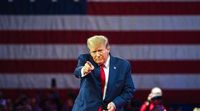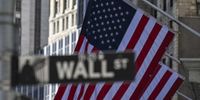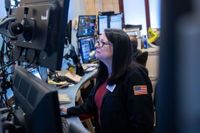U.S. stock futures hovered around the flatline on Wednesday, April 9, 2025, following the implementation of President Donald Trump’s sweeping tariffs that have raised concerns among investors. The tariffs, which include an additional 50% levy on Chinese goods, have escalated tensions in the ongoing trade conflict between the United States and China, leading to significant market volatility.
On the previous day, the benchmark S&P 500 index closed below 5,000 for the first time in almost a year, reflecting the market's unease as traders braced for the economic impact of these new tariffs. By 03:34 ET (07:34 GMT) on Wednesday, futures for the Dow Jones Industrial Average had slipped by 74 points, or 0.2%, while S&P 500 futures fell by 11 points, also 0.2%, and Nasdaq 100 futures dropped by 18 points, or 0.1%. This follows a turbulent trading session where initial gains were quickly erased as White House officials confirmed the new tariffs would proceed despite the market's negative reaction.
The tariffs, announced by Trump during a White House Rose Garden event, have sent shockwaves through the financial markets. The S&P 500 has lost approximately $5.83 trillion in value since the tariff announcement on April 2, marking the heaviest four-day loss since the index's inception in the 1950s. The index is now perilously close to bear market territory, typically defined as a 20% decline from a recent peak.
U.S. Trade Representative Jamieson Greer stated in a Senate committee hearing that Trump has no plans to alter his tariff strategy in the near term, despite the stock market's downturn and growing fears of a potential recession. "The President is committed to addressing unfair trade practices, and these tariffs are a crucial part of that strategy," Greer explained.
As the trade war escalates, China has vowed to retaliate against the U.S. tariffs, which now total 104% on many Chinese goods. This has led to heightened tensions, with Chinese officials labeling the U.S. actions as economic blackmail. Despite these challenges, Trump remains optimistic, asserting that many countries are eager to negotiate favorable trade agreements with the U.S. He mentioned, "A lot of countries are keen on making deals," highlighting China as a potential partner.
In addition to the tariffs, investors are closely monitoring upcoming earnings reports from major companies. Delta Air Lines and Constellation Brands are set to release their financial results, with analysts expecting Delta to provide insights into demand amid the ongoing trade tensions. Analysts at Vital Knowledge noted, "Sentiment around airlines has become extremely negative amid worries that demand will tumble due to the recent tariff-induced macro/financial volatility." Constellation Brands, known for its popular beer brands, will also shed light on consumer demand and the fallout from tariffs when it reports its earnings.
Recent economic data has shown a decline in consumer sentiment, with many Americans expressing concerns about their financial stability and the overall business environment. This cautious outlook is reflected in the stock market's performance, as traders become increasingly wary of the potential for a recession. Although there are no current indicators suggesting that the U.S. economy is in a downturn, the uncertainty surrounding the tariffs has prompted many consumers to tighten their spending.
On another front, oil prices have also taken a hit, dropping to their lowest levels in over four years. As of 03:33 ET, Brent crude futures fell by 2.6% to $61.20 per barrel, while U.S. West Texas Intermediate crude futures dropped by 2.7% to $57.98 per barrel. Oil prices have plummeted by about one-fifth since Trump announced the increased tariffs, marking the largest five-day drop since March 2022. This decline in oil prices is closely tied to the escalating trade war, as concerns over global economic growth continue to mount.
As investors await the release of minutes from the Federal Reserve's latest policy meeting, analysts suggest that the impact of these minutes may be overshadowed by the rapid changes in U.S. trade policy. The Federal Open Market Committee left interest rates unchanged at its March meeting, but policymakers hinted at potential cuts in borrowing costs by the end of 2025. However, the ongoing tariff situation complicates these forecasts, raising questions about inflationary pressures and their effects on economic activity.
In the broader stock market, the S&P 500 fell 1.6% on Tuesday, April 8, as investors prepared for the new tariffs. The Dow slipped 0.8%, while the tech-heavy Nasdaq tumbled 2.2%. Notable declines were seen in shares of Albemarle, the world’s largest lithium producer, which plummeted 12.6% after UBS cut its price target on the stock. Similarly, shares of Enphase Energy fell 11.2%, reflecting pressures on the renewable energy sector amid trade concerns.
Conversely, health insurance stocks experienced a boost following the announcement that Medicare payments would rise more than previously expected. Humana shares surged 10.7%, making it the top performer in the S&P 500, while CVS Health gained 5.9% after brightening its full-year outlook.
As the markets react to the ongoing trade developments, the focus remains on how these tariffs will affect consumer behavior and overall economic growth in the coming months. With both domestic and international factors at play, investors are bracing for continued volatility.






